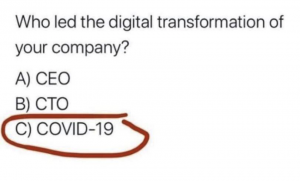Yesterday I noticed this little gem in my LinkedIn feed, courtesy of author Mark Metry:

There is, of course, a bit of wry humor behind it. But there’s also a great deal of truth – and a serious reality – particularly for manufacturers.
According to a March 2020 survey by the National Association of Manufacturers (NAM), 78% of manufacturers anticipate a financial impact from the COVID-19 outbreak. A majority (53.1%) also expect an impact to operations. Since that survey was taken a few weeks ago, those numbers have likely already risen across the board.
Protecting health, well-being and safety is the highest priority nationwide for consumers and workforces on the front lines. That means full or partial plant closures have been necessary for many manufacturers to help curb the spread of the virus, as well as to reduce economic losses.
But as companies pivot from reacting to reducing the impact of the outbreak, the right digital strategies will become more critical than ever to emerge from the crisis stronger – and smarter – than before.
Why Now
Simply put: digital transformation may no longer be a choice.
“Manufacturers and distributors lag behind the consumer world by at least 10 to 12 years in being customer focused,” noted one vice president in construction equipment manufacturing, quoted by Forrester Consulting in a recent commissioned study titled The Total Economic Impact of Working with Perficient in the Manufacturing Industry (March 2020).
For some, daily life is still filled with spreadsheets and file folders. Most agree that embracing digital technologies is necessary for survival. So is adopting a customer-centric mindset. But many don’t know how to get there – or in some cases, where to start – especially now.
Why Change: 3 Takeaways
COVID-19 has brought into focus the need for many organizations to accelerate digital transformation as they shift to remote working, revealing gaps in existing IT infrastructure, digital tools and automation.
For manufacturers, there’s also an increased need to:
- Take the pulse of your customers. Customer expectations are always key, but now is the time to think through long-term considerations around shifts in core markets and business models as a result of the outbreak.
Do you have the right information at your fingertips when it comes to your products, customers and marketing efforts? Real-time, integrated data will be critical for making smart adjustments – quickly. As customer journeys become more digital than ever before, only the most nimble manufacturers will rise above their competition.
Making the most of your marketing automation is essential for increasing efficiency, too. What are your customers’ current needs? What type of content would be the most useful for them? Consider how lifestyles and day-to-day routines have changed for your existing customers as you plan and automate campaigns. - Embrace digital dealer models. How will COVID-19 change the way your products are sold by dealers, distributors or other resellers? For some, integrating e-commerce and channel fulfillment strategies will become even more important.
Particularly if you manufacture equipment or other durable goods, focusing on online sales and fulfilling those orders through dealers – complete with pick-up or local delivery – offers more control, convenience and peace of mind for customers who don’t have to come within six (or a hundred) feet of a dealer. (By the way, our experts created a fantastic e-dealer fulfillment solution like this for Cub Cadet. Just ask if you’d like to see how it works.)
But what if e-commerce doesn’t make sense for your company? Creating a 360-customer is still key, especially when it comes to setting your dealers up for success. That typically starts with data integration, streamlined lead management and fully integrated digital marketing for a seamless customer experience. - Strengthen partner enablement. If you sell products through an indirect channel, there’s no doubt: you and your dealers are in this together.
Managing and strengthening those relationships will be more important than ever. For some, that may mean providing higher-quality leads and leveraging partner communities as one-stop shops for collaboration, centralized product information, up-to-date pricing and easy-to-access-anywhere sales tools. It may also involve more personalization, considering geographic limitations and local availability due to supply chain interruptions.
What’s Next
You’re in uncharted waters, and it’s difficult to make changes overnight. But the good news: you’re not alone. We’re here to help.
Forrester Consulting reports that manufacturers can experience 114% ROI and benefits of $3.8 million over three years by working with Perficient. For the commissioned study, Forrester Consulting interviewed executives who are responsible for driving digital transformation, as well as improving dealer and customer experiences. Some of the additional benefits in the study included:
- Increased customer engagement
- Improved partner relationships
- Improved data quality to create a 360-degree customer view
- Increased marketing budget efficiency, valued at $1.7 million
- 40% reduction in support calls, valued at $408,242 in savings
- $1 million in savings for internal systems development
- Faster implementation of PRM capabilities
You can download the full study below, featuring a deep analysis of savings, costs, results and real-world interviews with manufacturers. Or just want to talk? Contact us, and connect with an expert one-on-one about how COVID-19 has uniquely impacted your organization, what you’re struggling with, and the best places to start.
Much has changed in recent weeks. But our commitment to you hasn’t. We’re here, remote and ready, when you need us.

